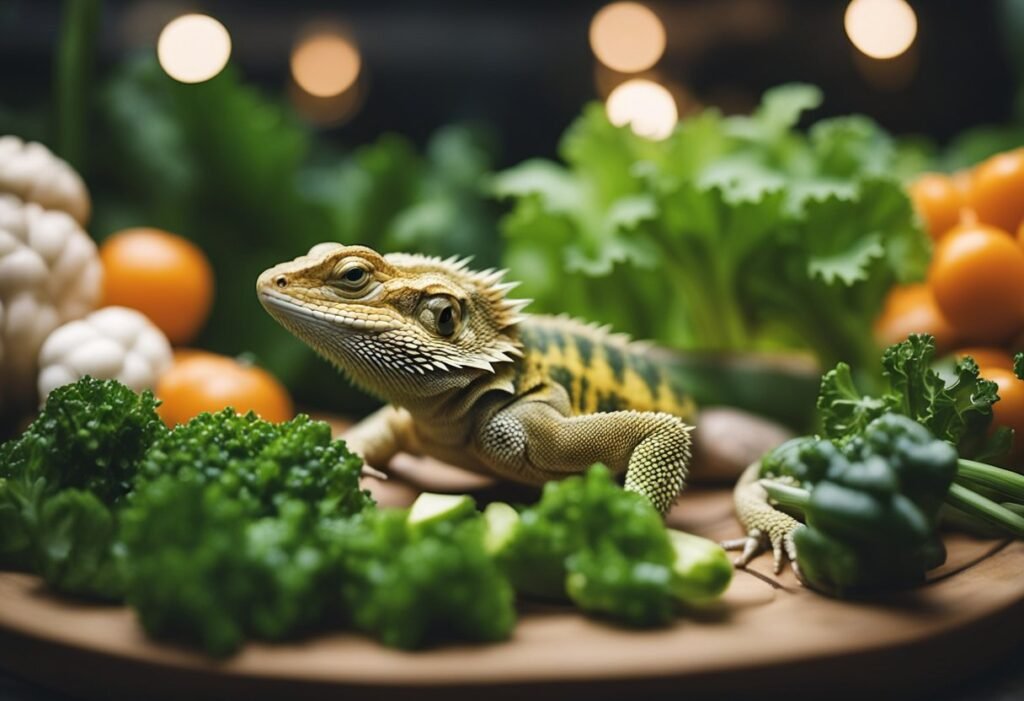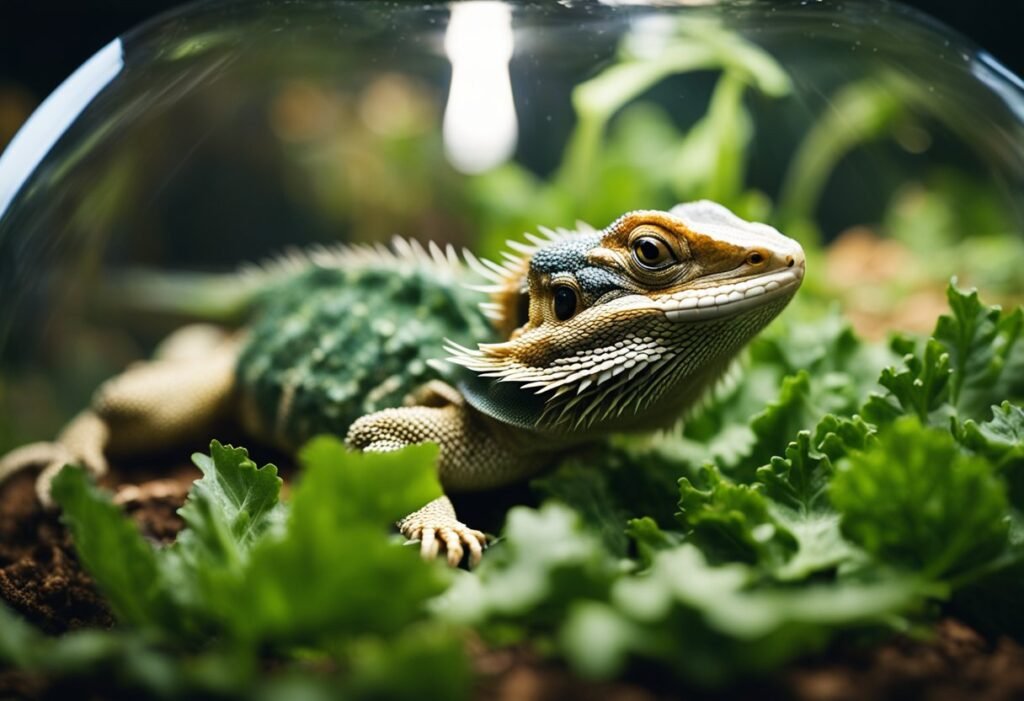Bearded dragons are popular pets and are known for their unique appearance and docile nature. As omnivores, they require a balanced diet of both plant and animal matter to thrive. While leafy greens are an important part of a bearded dragon’s diet, not all greens are created equal. In this article, we will explore whether kale is a suitable food for bearded dragons.
Kale is a leafy green vegetable that is often touted as a superfood for humans due to its high nutritional content. However, not all foods that are healthy for humans are healthy for animals. When it comes to bearded dragons, it is important to consider the nutritional value and potential risks of any food before offering it to your pet. In the following paragraphs, we will examine the nutritional benefits and potential drawbacks of feeding kale to bearded dragons, and provide recommendations for incorporating it into their diet.
Bearded Dragon Dietary Basics

Nutritional Needs
As responsible bearded dragon owners, we must ensure that our pets receive a balanced diet to maintain their health and well-being. Bearded dragons are omnivores, which means they eat both plant and animal matter. Their diet should consist of 80% vegetables, 10% fruits, and 10% insects.
It is important to note that bearded dragons have specific nutritional needs that must be met. They require a diet that is high in fiber, low in fat, and contains a balanced ratio of calcium to phosphorus. A diet that is deficient in any of these nutrients can lead to health problems such as metabolic bone disease.
Safe Foods for Bearded Dragons
When it comes to feeding our bearded dragons, not all foods are created equal. Some foods are safe for them to eat, while others can be harmful. Safe vegetables for bearded dragons include dark leafy greens such as collard greens, mustard greens, and turnip greens. Other safe vegetables include squash, carrots, and bell peppers.
Fruits should be fed in moderation due to their high sugar content. Safe fruits for bearded dragons include strawberries, blueberries, and raspberries. Insects such as crickets, mealworms, and dubia roaches are also safe for bearded dragons to eat.
Kale is often touted as a superfood for humans, but is it safe for bearded dragons to eat? While kale is high in nutrients such as calcium and vitamin A, it is also high in oxalates. Oxalates can bind to calcium and prevent its absorption, which can lead to calcium deficiency in bearded dragons. Therefore, kale should be fed in moderation and not as a staple food in their diet.
In conclusion, bearded dragons require a balanced diet that meets their specific nutritional needs. As responsible owners, we should ensure that we are feeding them a variety of safe vegetables, fruits, and insects. While kale can be fed in moderation, it should not be a staple food in their diet due to its high oxalate content.
Kale and Bearded Dragons

Kale Nutritional Profile
Kale is a leafy green vegetable that is rich in vitamins and minerals. It contains high levels of Vitamin A, Vitamin C, and calcium, which are all important for the health of bearded dragons. It also contains other nutrients such as iron, magnesium, and potassium.
Benefits of Kale for Bearded Dragons
Feeding kale to bearded dragons can provide them with a variety of health benefits. The high levels of Vitamin A can help to support their immune system and promote healthy vision. The calcium in kale can also help to support the growth and maintenance of strong bones. Additionally, the fiber in kale can aid in digestion and promote overall gut health.
Risks of Feeding Kale to Bearded Dragons
While kale can be a nutritious addition to a bearded dragon’s diet, it should be fed in moderation. Kale contains high levels of oxalates, which can bind to calcium and prevent its absorption. This can lead to a condition called metabolic bone disease, which can cause deformities and weak bones. It is important to balance the amount of kale with other calcium-rich foods, such as calcium supplements and other leafy greens.
In conclusion, kale can be a healthy addition to a bearded dragon’s diet, but should be fed in moderation and balanced with other calcium-rich foods. As always, it is important to consult with a veterinarian or reptile specialist to ensure that your bearded dragon’s diet is appropriate for their individual needs.
Feeding Kale to Your Bearded Dragon

Kale is a nutritious leafy green vegetable that is often recommended for human consumption. However, can bearded dragons eat kale? The answer is yes, but it should be given in moderation. Here are some guidelines on how to feed kale to your bearded dragon.
How to Prepare Kale
Before feeding kale to your bearded dragon, it is important to properly prepare it. First, wash the kale thoroughly to remove any dirt or pesticides. Then, remove the tough stems and chop the leaves into small pieces. Be sure to avoid feeding your bearded dragon any wilted or spoiled kale.
Recommended Kale Serving Size
While kale is a healthy food for bearded dragons, it should not make up the majority of their diet. We recommend feeding kale to your bearded dragon in small amounts, no more than once or twice a week. A good rule of thumb is to offer a serving size that is about the size of your bearded dragon’s head.
Frequency of Kale in Diet
Kale is a great source of vitamins and minerals, but it should not be the only vegetable in your bearded dragon’s diet. It is important to offer a variety of vegetables to ensure that your bearded dragon is getting all the nutrients it needs. We recommend rotating kale with other leafy greens such as collard greens, mustard greens, and dandelion greens.
In conclusion, kale can be a healthy addition to your bearded dragon’s diet when fed in moderation and prepared correctly. Remember to offer a variety of vegetables to ensure your bearded dragon is getting a well-balanced diet.
Alternatives to Kale
Other Leafy Greens
If you’re looking for a leafy green alternative to kale, there are plenty of options to choose from. Some of the most popular leafy greens for bearded dragons include collard greens, mustard greens, turnip greens, and dandelion greens. These greens are all high in essential vitamins and minerals, making them a great addition to your bearded dragon’s diet.
When choosing leafy greens for your bearded dragon, it’s important to choose organic options whenever possible. This will help to ensure that your dragon isn’t consuming any harmful pesticides or chemicals.
Vegetables and Fruits
In addition to leafy greens, there are plenty of other vegetables and fruits that can be included in your bearded dragon’s diet. Some great options include carrots, squash, sweet potato, bell peppers, and blueberries. These foods are all high in essential nutrients and can help to keep your dragon healthy and happy.
When feeding your bearded dragon fruits and vegetables, it’s important to remember that moderation is key. While these foods are healthy, they should only make up a small portion of your dragon’s overall diet. Too much fruit or vegetables can lead to digestive issues and other health problems.
Overall, there are plenty of healthy alternatives to kale that can be included in your bearded dragon’s diet. By choosing a variety of leafy greens, vegetables, and fruits, you can help to ensure that your dragon is getting all of the essential nutrients they need to thrive.
Monitoring Your Bearded Dragon’s Health

As responsible pet owners, it’s important for us to monitor our bearded dragon’s health. This includes keeping an eye on their diet and ensuring they are receiving proper nutrition. In this section, we’ll discuss some signs of good nutrition as well as symptoms of dietary issues.
Signs of Good Nutrition
A healthy bearded dragon should exhibit the following signs of good nutrition:
- Clear eyes
- Active behavior
- Regular bowel movements
- A healthy appetite
- A shiny, smooth coat
If your bearded dragon is lacking any of these signs, it may be an indication of a dietary issue.
Symptoms of Dietary Issues
It’s important to be aware of the symptoms of dietary issues in bearded dragons. Some common symptoms include:
- Lack of appetite
- Lethargy or lack of energy
- Weight loss or gain
- Discolored or dry skin
- Swollen limbs or joints
- Diarrhea or constipation
If you notice any of these symptoms, it’s important to take action and adjust your bearded dragon’s diet accordingly.
In summary, monitoring your bearded dragon’s health is crucial to ensuring their overall well-being. By being aware of signs of good nutrition and symptoms of dietary issues, we can be proactive in maintaining their health and happiness.
Frequently Asked Questions
Is it safe for bearded dragons to consume kale leaves?
Yes, kale is safe for bearded dragons to eat in moderation. Kale is a good source of calcium and other essential nutrients that bearded dragons need in their diet. However, too much kale can cause health problems such as kidney issues, so it’s important to feed it in moderation.
How frequently should kale be included in a bearded dragon’s diet?
Kale should be included in a bearded dragon’s diet once or twice a week. It’s important to provide a variety of vegetables to ensure a balanced diet and to prevent overconsumption of any one type of food.
Are there any risks associated with feeding spinach to bearded dragons?
Yes, spinach contains high levels of oxalates, which can bind to calcium and prevent its absorption. This can lead to metabolic bone disease in bearded dragons. It’s best to avoid feeding spinach to bearded dragons and opt for other greens instead.
What variety of vegetables is recommended for daily consumption by bearded dragons?
Bearded dragons should consume a variety of vegetables daily, including collard greens, mustard greens, turnip greens, and dandelion greens. These greens are high in calcium and other essential nutrients that bearded dragons need.
Which greens should be avoided in a bearded dragon’s diet?
Some greens should be avoided in a bearded dragon’s diet, including spinach, kale stems, and lettuce. These greens either contain high levels of oxalates or low nutritional value.
What is the preferred choice between kale and collard greens for bearded dragon nutrition?
Both kale and collard greens are good sources of nutrients for bearded dragons. However, collard greens have a lower oxalate content than kale, making them a better choice for daily consumption. It’s important to provide a variety of greens in a bearded dragon’s diet to ensure a balanced intake of nutrients.
I, Mark Antonelli am highly interested in pet care tips. The experiences I gained through university life in animal sciences were also helpful to identify the best tricks for caring for and feeding varying kinds of pets. I know the majority of people love to own a pet. Yet, there is a guilty of owing a Bearded Dragon due to a lack of information about how much friendly and peaceful they are. I thought of filling this gap with detailed writings about this Pogona genus Bearded Dragon. All my team is also giving me great support to fulfil my mission. Hope you will enjoy the journey with us.

